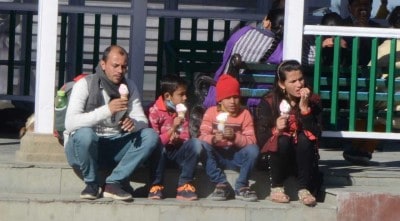 By Vishal Gulati
By Vishal Gulati
Shimla, Jan 13 : If the chill in the plains of northern India runs down your spine these days, travel to the hills in Himachal Pradesh where the sun is shining brightly. The reason is less humidity in the hills compared to the plains where the sun is largely fogged out.
Manmohan Singh, the Director of the India Meteorological Department here, told IANS on Wednesday that the hill stations in the state currently have more pleasant weather owing to longer duration of sunshine compared to the plains.
“The maximum and minimum temperatures in most of the places in Himachal Pradesh are high due to prevailing dry weather and no foggy conditions,” he explained.
The humidity level of 70 per cent or more causes fog. In the plains, he said, it is close to 100 per cent. However, in the hills it’s between 30 and 40 per cent.
According to him, Shimla’s humidity level was 32 per cent whereas it was 86 per cent in Chandigarh, which is located in the plains.
He said the dry weather conditions in the hill state would continue at least for over a week.
In Shimla, which is located around 7,000 feet above sea level, the minimum temperature on Wednesday was 5.7-degree Celsius, while in Chandigarh, which is located in the foothills of the lower Shivaliks, it was also 5.7-degree Celsius.
The maximum temperature in Shimla and Chandigarh was 18.4-degree Celsius and 11.1-degree Celsius, respectively, meaning the plains were colder than the hills.
“What a pleasant sun in Shimla compared to the bone-chilling cold of Delhi where a dense layer of fog engulfs the city almost throughout the day,” said Ankit Dubey, a tourist.
His wife Silky added: “In Delhi, the sun is a luxury these days. So it is better to be in the hills where the weather is dry and you can enjoy long sunny days.”
The minimum temperature in another hill destination, Dharamsala, the seat of Tibetan spiritual leader the Dalai Lama, was 3.6-degree Celsius, whereas the popular tourist spot of Manali, where nearby hills are wrapped up in a white blanket, saw a low of one degree Celsius.
In Punjab’s Amritsar and Ludhiana, the minimum temperature was 3.5 and 3.8-degree Celsius, respectively, while it was 1.4-degree Celsius in Haryana’s Narnaul, the coldest in both the states.
Delhi woke up to a bone-chilling cold of 3.2-degree Celsius on Wednesday as a dense layer of fog engulfed the national capital. Likewise, a thick blanket of fog enveloped many places of both Punjab and Haryana.
Hill stations like Kasauli, Chail, Kufri, Narkanda, Palampur and Manali are bright, sunny and perfect for a break from the dismal winter weather of the plains.
The weatherman attributed the rise in temperature in the hills to long, sunny days that kept the minimum and maximum temperatures up by several notches.
However, unusually rising mercury owing to long dry spells is not going down well for Shimla residents as they say there has been a noticeable change in the climatic conditions of the town in the past 20-25 years.
“Now the snow is going missing from Shimla’s landscape,” remarked Subhash Gupta, a former government employee settled in the town since 1960.
“Earlier, most of our family members preferred to migrate to the lower hills from December onwards owing to extreme cold conditions. Now, the locals have almost stopped migration. In fact, a chunk of tourists have started coming here in the winter months,” he said.
Another resident, Prem Lal Negi, said that Shimla in recent years has hardly experienced heavy snow. “Earlier, you couldn’t stay without a heating system in entire Shimla. Now, it is required only at the highest points of the town like Jakhu,” he added.
Environmentalists blame deforestation and rise in vehicular pollution for the change in Shimla’s extreme climatic conditions.
(Vishal Gulati can be contacted at vishal.g@ians.in)
Disclaimer: This story is auto-generated from IANS service.

